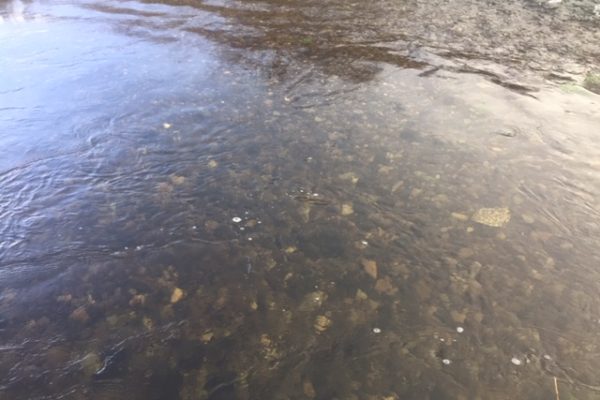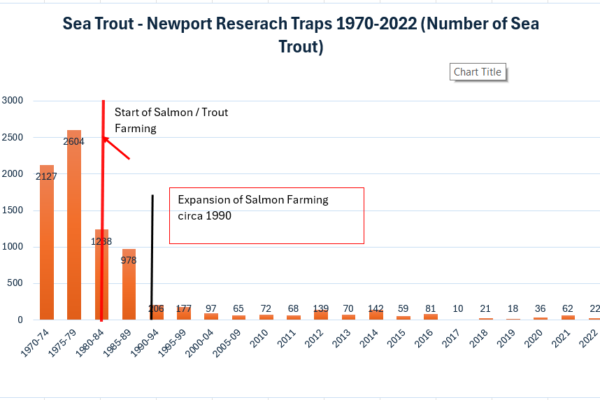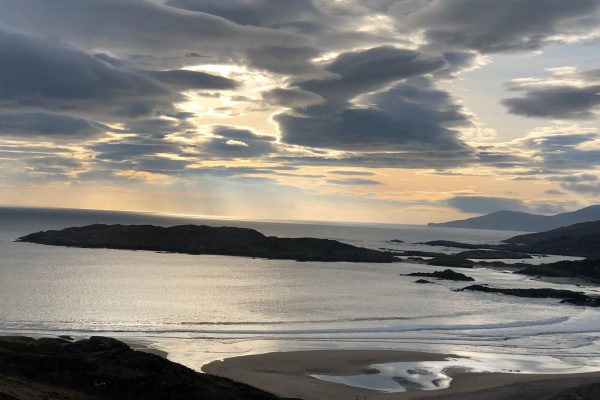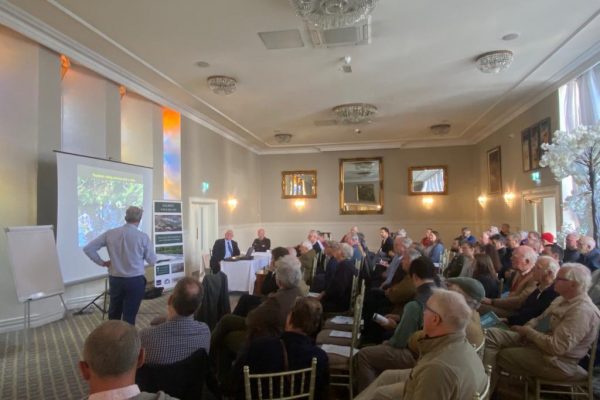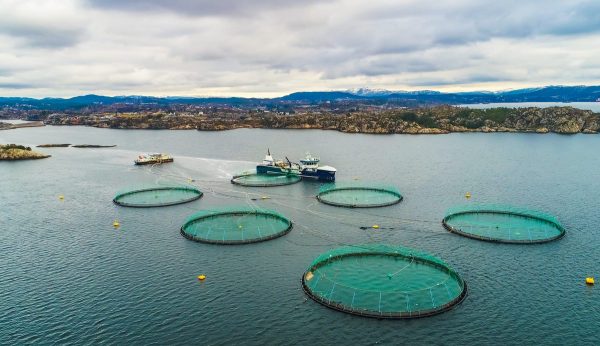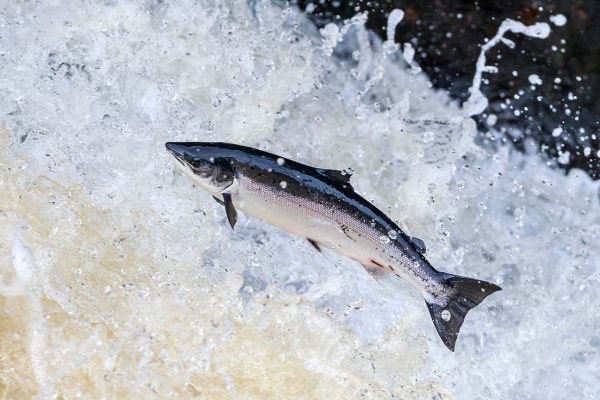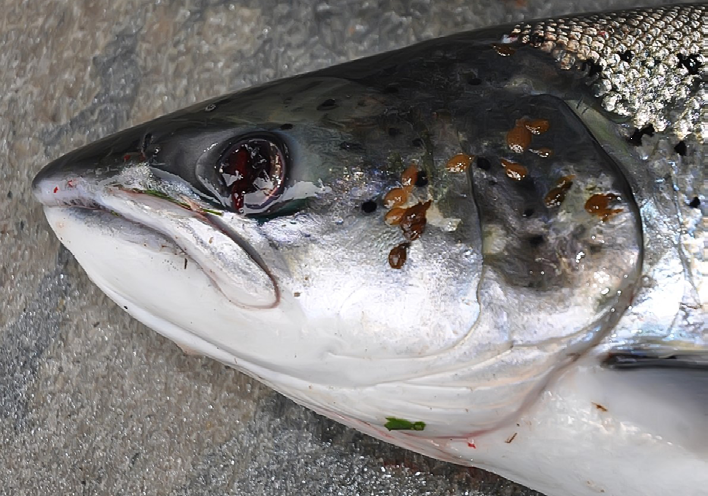-
Ballisodare Atlantic Salmon Mortalities
With a large number of mortalities and an ongoing investigation by IFI and the Marine Institute it would suffice to say that to lose up to 900 adult salmon is a tragic outcome for this river. We await the outcome of the investigation but we are aware that it appears that the losses are primarily adult salmon. This may be related to oxygen demand as the river appears to be low over a prolonged period. Larger fish require higher levels of oxygen and large quantities in a relatively small area of a river can trigger stress and lead to secondary infections. Higher water may alleviate this but weakened fish may not survive even if distributed further upstream. There appears to be a rise in water over the past number of days and we will see if this alleviates the situation. While there are reports of a large run through the counter it is apparent that the loss of adult salmon at this scale can have consequences for spawning numbers and that other adult salmon may have a compromised survival chance through stress related secondary infections. We would certainly support an engineering solution to natural barriers if these are deemed to be partly responsible for the mortalities.
Continue reading -
Marine Institute – Sea Trout Collapse
This is a graph of sea trout collapse in the Burishoole system in the west of Ireland. This is a stark reminder that sea trout and salmon farming are mutually exclusive. Salmon farms basically make sea trout survival impossible. This station is operated by the Marine Institute which is in denial of the destruction of wild salmonids by salmon farms. The recent post from Alexandra Morton showing the effect bares a striking resemblance to this. The data source is the annual report of the Newport Research which is publicly available at the following link. Marine Institute Report There is a data set of both salmon and sea trout spanning back to 1970.
Continue reading -
New Study on plankton in North Atlantic – Atlantic Salmon Survival
This new study reinforces the belief that Atlantic salmon survival has been compromised substantially by a changing ecosystem in the North Atlantic. We must redouble our efforts to substantially increase wild healthy juveniles going to sea and give them the best chance of survival by protecting water quality and habitat integrity. Mitigation for ecosystem compromise in the ocean is essentially difficult short term but larger healthy wild smolts going to sea will certainly improve survival. New Missing Salmon Alliance paper brings us closer to understanding the decline in marine survival of wild Atlantic salmon
Continue reading -
Please Help Atlantic Salmon in 2024
This year we have seen a continuation of poor returns to Irish rivers. There may be many factors involved in this situation but it is evident that we collectively need to secure as many large spawning fish as possible to bolster compromised spawning escapement. To help in this matter Salmon Watch Ireland is asking all angling stakeholders to minimise their impact on remaining stocks. The angling stakeholders have a choice and can limit their catch. The over generous national limit of an individual harvesting ten salmon should be substantially reduced this year by the voluntary actions of the angling community. We would ask that angling is carried out with a view to releasing fish by using appropriate methods. We also request that salmon of over 65cm be released and no fish should be harvested in September. The choice to do this is voluntary and we will be asking that these over generous rules involving individual harvest by anglers to be substantially reduced going forward. While we have requested that commercial fisheries should be closed going forward and a appropriate scheme to alleviate hardship on fishermen be introduced, we are going to canvass the commercial sector through Inland Fisheries Ireland this year to reduce their effort and limit their uptake of quota. We will request that if fish counter results show a substantial decline on normal (poor) returns by mid July, Inland Fisheries Ireland and Department of Environment , Climate and Communications should consider that exploitation be further controlled by regulation. In the interim it would greatly help the situation if all stakeholders cooperated in this voluntary effort to protect what remains. We in Salmon Watch Ireland are conscious that salmon are under enormous pressure in all countries and we would hope that in future there may be an improvement in stocks which would allow a sustainable harvest by stakeholders but this present situation is alarming given the widespread and accelerating decline. Please limit your catch
Continue reading -
Opening Remarks AGM – Salmon Watch Ireland
Welcome to Salmon Watch Ireland’s AGM for 2023 being conducted by Zoom. This meeting is primarily held to conform with our obligations under the Companies Act. 2023 was again a year primarily dominated by our Judicial Review on the decision to award an aquaculture licence to MOWI in Bantry Bay. Having taken the decision to enter into this legal process it was necessary to devote a considerable amount of time to research our main avenues of approach to the legal process. The Judicial review took place in April/May and was a very complex case involving three separate parties taking the review namely IFI, SWIRL and Sweetman and others including FISSTA. The judgement is still outstanding, and we are certainly concerned at the time period this judgement is taking to finalise. We certainly agree that the hearing of the case was exceedingly fair and indeed comprehensive with all parties given a fair hearing. The judgement is listed for mention again in October, but we may see a judgement at a date earlier. I would like to thank all our directors and indeed our members and supporters who helped to prepare and support us both financially and with advice which enabled us to pursue this case. The 2023 salmon run in Ireland was extremely poor with regard to both grilse, and spring salmon. Certainly, it is probable that it was the lowest return in the time series. It will be interesting to see how this will be reflected in catch statistics and indeed how the fish counter report might illuminate and reinforce our view of stocks. It is also interesting that spring stocks in 2024 suggest extremely poor returns which feeds into the narrative that linkage exists between grilse and MSW stocks in regard to survival at sea in first year. The return of salmon to Ireland is in a very precarious position with stocks now at 10% of historic highs. This is also reflected in most countries supporting Atlantic salmon stocks with UK and Norway showing a similar decline. There is also evidence that the decline in perceived strongholds like Iceland and the Russian Federation is now accelerating and showing a similar worrying trend. The scale and basin wide declines are consistent with oceanic influences which may be related to warming SST which can and does have cascading influence on currents and productivity at sea. It is also worth noting that Baltic salmon saw a dramatic decline in 2023 which would certainly be remote from Atlantic influence, so a climate explanation is suggested. There is also a suggestion that unregulated high seas fisheries directed at Atlantic salmon may be occurring but evidence of this is currently not reliable, but areas of concern are North of Faroes and South of Greenland. These areas are consistent with fisheries for salmon which were carried out by the Faroes and Greenland during 1970s and 1980s. However, the evidence of these fish coming to market is not available. We do know that there are complex reasons which dictate strength of salmon populations but with a background of practical elimination of legal harvest it is not beyond the possibility that other illegal directed fisheries have grown in international waters. This must be investigated by NASCO and must include a directed and well-resourced program going forward. The newest threat to Atlantic salmon is certainly the vast and continuing expansion and strengthening of the pink pacific salmon presence in the North Atlantic. While these fish would appear to present difficulties in freshwater, we would suggest that vast populations of these fish are now at sea in Northeast Atlantic and certainly will further compete with all species in traditional feeding areas for Atlantic salmon. There is anecdotal evidence that pink salmon have reduced other pacific salmon populations through competition in North Pacific. Coming closer to Ireland it is quite evident that we have enormous problems in regard to water quality and other issues related to loss of biodiversity. It is alarming that the regular updates on water quality by the EPA usher in a consistent and robust denial of the role that agriculture plays. The agriculture lobby is strong politically but the derogation situation in regard to organic nitrogen limits will have to be discontinued and SWIRL will be actively promoting its removal. The spectre of lack of investment by the state in wastewater infrastructure is now coming to a head with a renewed investment in housing with consequent overload of already inadequate treatment plants.Again, SWIRL will be seeking to empower local communities to make observations on planning to seek proper and reliable infrastructure. We have also continued to engage in regard to open cage salmon aquaculture with a large number of submissions in regard to renewals of expired licences. We also are still awaiting a determination of our EU complaint against Ireland in relation to legislation surrounding salmon aquaculture. The issue of mortalities on Irish salmon farms has been consistently mentioned and is outside international norms which is certainly reflective of an industry which should never be operating in Irish waters. Mortalities and disease are certainly indicative of a dangerous near coastal environment which has the probable outcome of many negative outcomes for wild salmonids. SWIRL again has been at the forefront in calling for exploitation being reduced substantially. The commercial harvest of salmon is certainly not consistent with low stock levels and needs to be dis-continued while more protection of salmon from over harvest by other stakeholders is a necessity. Directed conservation is required with larger fish requiring more protection. We still view the allocation of ten tags as being over generous in times where salmon stocks are at such low levels. We have consistently not called for mandatory catch and release in rivers with a surplus, but we certainly cannot be happy in a situation whereby certain stakeholders may be compromising the calculations through inaccurate returns. Accordingly, we have made suggestions on how the process can be improved to increase accuracy. It would not be incorrect to suggest that very few salmon catchments are managed in an effective way. We need a situation where properly resourced management structures on rivers lead to a better outcome for the resource.To this end SWIRL has taken a strategic evaluation of our focus going forward and have decided to endeavour to empower local communities to act in the interests of salmon conservation through practical actions facilitated by resources provided by us. We again facilitated an annual conference and awarded the Salmon Hero Award for the excellent and ongoing work on the Suir Tributaries. The award is in recognition of local community involvement in preserving local salmonid populations through practical actions. These annual conferences serve as a very important information resource to which all stakeholders can engage in and will certainly be continued and expanded. ENDS.
Continue reading -
Request for Atlantic salmon conservation initiatives in month of September
Salmon Watch Ireland is asking the angling community to help preserve Atlantic salmon stocks by returning all salmon during the month of September. The background to this request is that the Atlantic salmon has faced a devastating downward spiral over the last number of decades but the past number of years have demonstrated an accelerated decline. While Salmon Watch Ireland has consistently supported the scientific process involved in managing Ireland's salmon stocks on an individual catchment basis, it is time to consider whether exploitation can continue in September this year, given the perilously poor catches experienced in Ireland and indeed throughout UK and further afield. While forecasting returns of salmon can be difficult there must always be scope to manage stocks on a real time basis and accordingly we will be suggesting major changes to the present way harvesting of salmon is managed. The advice for 2023 from the Technical Expert Group on Salmon in regard to rivers where surpluses were forecast, appears not to have materialised, and thus we as a conservation body are strongly advising the angling community to think of the next generations of salmon and return fish on a voluntary basis during September. These fish in September are more readily caught by rod and line as they exhibit heightened aggression so releasing fish is your way of demonstrating that you are playing your part in support of wild salmon. While we cannot influence individual attitudes it is hoped that such an initiative may help to get more salmon spawning this coming winter. The following graphs are taken from TEGOS advice and illustrate that 2022 was the lowest count of grilse on record which will almost certainly be much lower in 2023. The spring was exceptionally poor in 2023 which demonstrates an apparent link to survival at sea during the salmon's first year at sea.
Continue reading -
AGM Remarks by Chair John Murphy
Remarks by John Murphy, chair of the board of Salmon Watch Ireland CLG, to the company’s annual general meeting on Monday 19th June 2023. Welcome to Salmon Watch Ireland’s AGM for 2022 being conducted by Zoom. This meeting is primarily held to conform with our obligations under the Companies Act. 2022 was a year primarily dominated by our impending Judicial Review on the decision to award an aquaculture licence to MOWI in Bantry Bay. Having taken the decision to enter into this legal process it was necessary to devote a considerable amount of time to research our main avenues of approach to the legal process. I would like to thank all our directors and indeed our members and supporters who helped to prepare and support us both financially and with advice which enabled us to pursue this case. The Judicial Review took place over four weeks in April /May 2023, and we expect an outcome in the near future. The 2022 salmon run in Ireland was extremely poor with regard to grilse, but spring salmon runs appeared to be on an upward turn although from a low stock level. The low level of grilse last year did manifest as a very poor reported spring salmon stock this year with anecdotal evidence suggesting a collapse in the majority of fisheries both here and the United Kingdom. Generally speaking, this may be related to the abnormally low river levels which greeted the adult stocks here and UK in 2018. This was also mentioned by the ICES working group on North Atlantic salmon and seems to be a recurring theme with the summer of 2022 experiencing very low water levels. Again, there is no need to mention this year as the trend continues. On a more positive note, the early spring this year did favour a more positive environment for smolt migration. These fish are the progeny of the 2020 run of adults which showed a very welcome upturn in stocks. The IFI fish counter data is indicative of an increased run of spring fish in 2022 but a large decline in grilse stocks and is probably at an all-time low when looked at over an extended period. It is evident that climate is causing a very poor environment for Atlantic salmon and these periods of low flow in conjunction with high water temperatures cause a cascade of effects with predation and biological factors having a significant negative effect on juvenile and adult survival. In conjunction with the pressures at sea it is evident that the future is far from secure. While most of these factors may be out of our control, we must continue to endeavour to maximise the amount of wild healthy smolts going to sea. It is interesting to note that a recent study in the UK noted that larger smolts survived to return at three times the rate of smaller smolts. Again, with a warming climate, can we expect larger wild smolts, I would suggest not. The publication of the state of Irish waters by the EPA for 2022 notes little improvement in regard to nitrate levels in Irelands rivers and lakes and is a major concern for salmon survival. It is evident that the farming community are engaged in a political agenda with little concern for climate or indeed the wider environment. Unfortunately, the vote on the recent legislative change at EU level in regard to protecting degraded land was postponed for one month which is disappointing but demonstrates that there is a considerable opposition to protecting nature which is all too evident within this country. With changing weather patterns, we are seeing a very substantial reduction in rainfall during critical periods for salmonid migration which only exacerbates an already precarious situation. In early 2022 we sought through FOI correspondence between Minister Eamon Ryan and Minister Charlie Mc Conalogue regarding sea lice and their impact on wild salmonids. This was further illuminated by the Irish Times in August and a special segment on Prime Time followed in October. It is very significant in that a government department was willing to take on DAFM regarding their rather benign interpretation of the impact that salmon farming has on wild salmonid stocks. IFI were very robust on the Prime-Time program which is a welcome departure from previous pronouncements on the subject. This was further demonstrated with their participation in the Judicial Review. There appears to be a more proactive approach from IFI and there is further evidence that they are ramping up pressure with the recent job advertisement looking for a project manager to investigate nationwide introgression from farm escapees. These developments may have a bearing on future JR procedures. Mark Boyden from the Coomhola Salmon Trust was the recipient of our Salmon Hero Award in 2022. Mark has been at the forefront of educating Irelands school children on salmon matters for the best part of 30 years. He was most appreciative of our efforts to conserve Atlantic salmon. We did not hold a conference in 2022 but hope to hold one in 2023. Our focus has somewhat been overwhelmed by the judicial review process but we would hope to concentrate more on other issues going forward. The issue of commercial exploitation of salmon is causing a serious amount of controversy and our policy to effectively finish this practice must be revitalised. It is not an attempt to change the location where salmon are harvested as we also would like to limit exploitation by recreational anglers. The ability to harvest ten salmon by anglers is certainly not sustainable from a moral point of view and should be reduced significantly. It would be our intention to seek a redesign of the management of our salmon stocks with a review of conservation limits and surplus determination. It may be time now to increase the statistical probability of 75% of reaching a conservation limit to a higher number thus taking a more precautionary approach in these volatile times for salmon survival. On the aquaculture front we will continue to oppose open cage farming and intend to design a template for publication which will allow all to oppose licences in a concerted, legal and scientific manner. With stocks in such a precarious situation it may be time to examine rebuilding strategies. It is obvious that certain rivers have radically insufficient stocks to repopulate rivers. In these rivers we must use the best available strategies to rebuild stocks ENDS:
Continue reading -
Ballinakill Salmon Farm- Submission
Application for licence for an open cage salmon farm at Ballinakill Bay, Co Galway Dear Minister, The documentation submitted by Comhlucht Iascaireachta Fanad Teoranta, (CIFT), trading as MOWI Ireland, seeking a licence for an open cage salmon farm to be sited in Ballinakill Bay, County Galway, falls far short of what is required pursuant to Article 6(3) of the Habitats Directive. Nor can there be reliance on Article 6 (4) thereof, as there are no stated ‘imperative reasons of overriding public interest’, (IROPI), which could justify locating a salmon farm at this sensitive location. The proposed site is within close proximity to the Dawros river mouth. This river forms part of the ‘Twelve Pins Garraun Complex,’ Special Area of Conservation, (Site Code 002031). In this river Wild Atlantic Salmon are a ‘Qualifying Interest.’ Juvenile salmonids, which are already susceptible to mortality from parasitic sea lice from the existing salmon farm in Ballinakill Bay, would be also subject to the cumulative impact of the additional sea lice loading from the proposed MOWI/Marine Harvest salmon farm. No appropriate assessment has ever been conducted in relation to the adverse impact of the existing salmon farm, which is there already. It is suggested that Appropriate Assessment must be conducted on the cumulative effect of both salmon farms before any decision may be reached. Read More - Full Submission
Continue reading -
Management of Tagging System – Submission
The submission from Salmon Watch Ireland in regard to the management of the Salmon and Sea Trout tagging system seeks to offer more protection to spring salmon. To this end SWIRL have suggested some targeted solutions which will effectively conserve salmon. It is essential that commercial salmon fisheries do not exploit spring salmon and that recreational anglers reduce exploitation on these ecological valuable fish. A general tightening of the tagging system is warranted and we have suggested a number of administrative changes to help and streamline the system. It is imperative that we move to a real time online system to guage how stocks are performing. The issue of recreational and commercial exploitation must reflect on how the magnitude of the surplus is related to the conservation limit. It is imperative that the traceability of wild commercially caught salmon is improved to tighten quota compliance. Our policy would also support a moratorium on commercial exploitation especially on rivers with a relatively low surplus. In the longer term with continued fluctuation in survival indices it may be pertinent to examine the issue of commercial exploitation and indeed recreational exploitation with a view to reducing exploitation. There would appear to be a very limited scope going forward to allow the continuation of a commercial fishery and Salmon Watch Ireland is supportive of a scheme to alleviate losses to the commercial sector. Read the full submission here
Continue reading -
The Status of Irish Salmon Stocks in 2020 with Catch Advice for 2021
Salmon Watch Ireland would like draw your attention to the recently published document from the Technical Expert Group on Salmon. We will answer any questions that you may have or request clarification from TEGOS on aspects that you are concerned with. The links to the reports are listed here: Catch Advice 2021 River Specific Advice The Technical Expert Group on Salmon (TEGOS) advises that in 2021: 48 rivers have an advised harvestable surplus as they are exceeding their conservation limits (CLs). A further 32 rivers, may be opened on a catch and release only basis, subject to IFI management criteria based on having a high probability of achieving 50% of their conservation limit (CL) or exceeding the management qualifying fry threshold of ≥15 fry (0+) per 5 minute electrofishing (multiple site catchment average). In addition 64 rivers are (a) failing to meet 50% of their CL or (b) recent data to determine their CL attainment status are lacking. Where there is a lack of data, or where catchment-wide electro-fishing surveys indicate juvenile abundance below the fry threshold, the TEGOS assumes that these rivers are failing to meet CL. There are 16 rivers for which there are significant fisheries on the MSW (spring salmon) component of the stock and a separate assessment is made. Of these: 11 have an advised harvestable surplus as they are exceeding their CL. 5 rivers may be opened on a catch and release-only basis subject to IFI management criteria as they have a high probability of achieving 50% of their CL or exceed the minimum mean fry threshold (≥15 fry) in catchment-wide electro-fishing. There are currently 40 rivers or river tributaries of the 144 salmon rivers assessed in Special Areas of Conservation (SACs) where salmon have a qualifying interest under the EU Habitats Directive. Of these, only 20 are above their CL.
Continue reading

